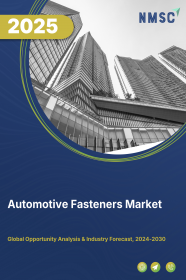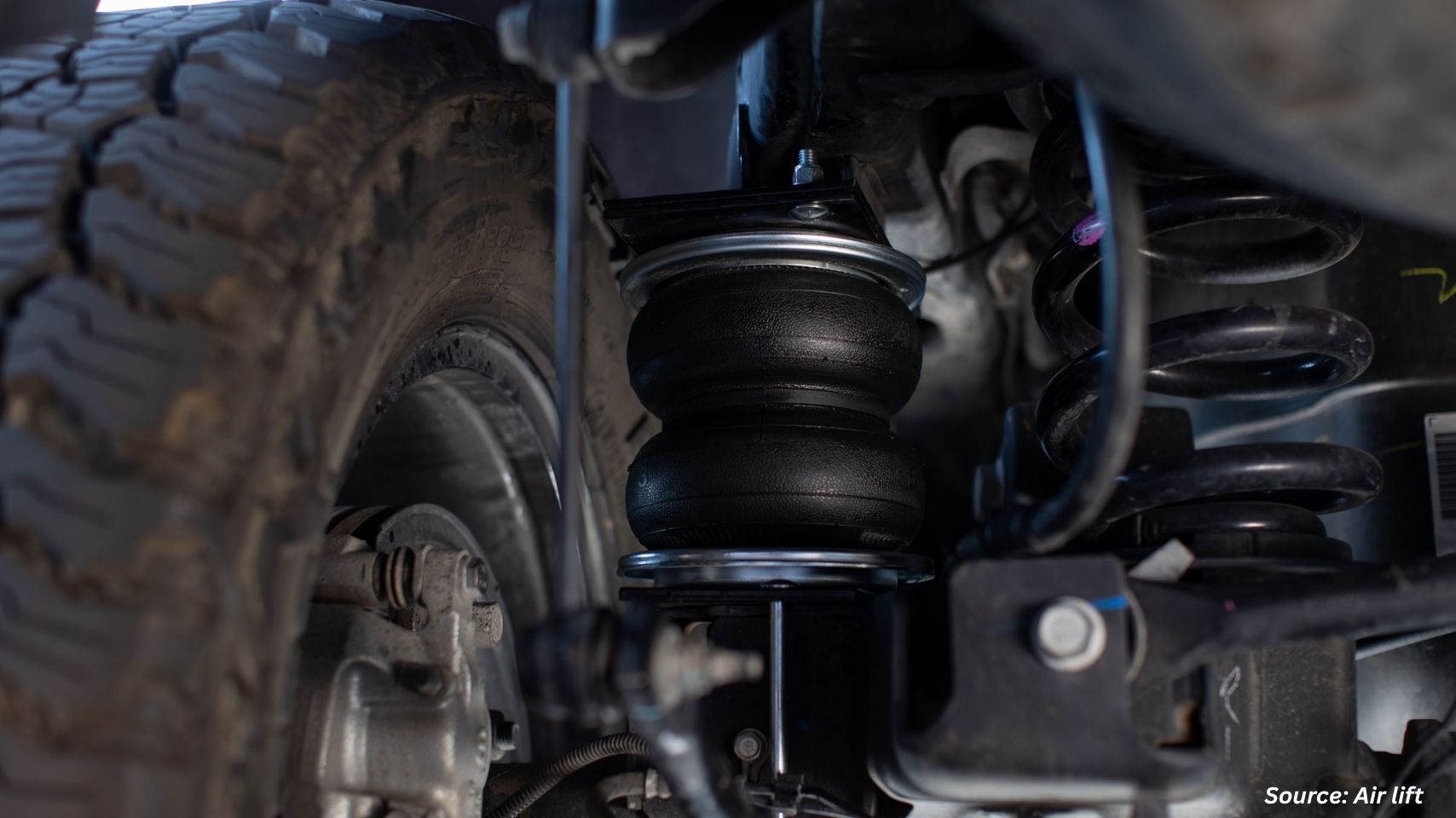
Automotive Fasteners Market by Product Type (Threaded and Non-Threaded), by Characteristics (Removable, Semi-Permanent, and Permanent), by Material Type (Iron, Steel, Aluminum, Brass, Nickel, and Plastic), by Application (Engine, Chassis, Transmission, Steering, Front/Rear Axle, Interior Trim, and Others), by Vehicle Type (Passenger Cars and Commercial Vehicles)and Others-Global Opportunity Analysis and Industry Forecast 2024-2030
Market Definition
The Automotive Fasteners Market size was valued at USD 23.37 billion in 2023 and is predicted to reach USD 34.39 billion by 2030 with a CAGR of 5.7% from 2024-2030. Automotive fastener refers to any hardware component used in the assembly, repair, or maintenance of vehicles, specifically designed to securely join or fasten various automotive parts together. These fasteners play a crucial role in ensuring structural integrity, safety, and functionality within vehicles, encompassing a wide range of types such as bolts, screws, nuts, clips, rivets, and pins. Automotive fasteners are engineered to withstand the demanding conditions of automotive environments, including vibration, temperature variations, and mechanical stress, while often adhering to industry standards and specifications to ensure compatibility and reliability.
Market Dynamics and Trends
The increasing global automotive production and the rising demand for both passenger and commercial vehicles are driving the expansion of the market. According to the European Automobile Manufacturers' Association, global motor vehicle production reached approximately 79.1 million units in 2022, reflecting a 1.3% increase from the previous year. With automotive manufacturers striving to meet growing consumer demand, there is a corresponding need for a wide range of fasteners to assemble these vehicles efficiently and securely.
The growing emphasis on reducing vehicle emissions and combatting environmental pollution is fueling the adoption of electric vehicles (EVs). Government initiatives worldwide, such as those seen in the US, Canada, Mexico, and the UK, aim to transition fleets to zero-emission vehicles by 2040. This push toward eco-friendly transportation solutions is driving the demand for automotive fasteners, as EVs require specialized fastening systems for assembly and maintenance.
Additionally, the enforcement of stringent safety regulations within the automotive industry is driving market growth. Regulatory bodies mandate the use of high-performance fasteners to enhance vehicle safety and reliability. This regulatory push is prompting automakers to invest in advanced fastening solutions capable of meeting or exceeding safety standards. Consequently, there is a growing demand for innovative fastening technologies capable of withstanding extreme conditions and improving overall vehicle performance.
However, automotive fasteners are tested and certified to ensure they meet safety and environmental standards, which can be costly & time-consuming, which poses challenges for the growth. On the other hand, the introduction of Self-locking fasteners and Advanced Coating Technology is expected to create ample growth opportunities for the automotive fasteners market in the future. Self-locking fasteners, also known as self-clinching fasteners, are designed to securely lock in place without the need for additional hardware such as nuts or bolts.
Market Segmentation and Scope of Study
The global automotive fasteners market is segmented on the basis of product type, characteristics, material type, application, vehicle type, electric vehicle type, and geography. Based on product type, the market is classified into threaded and non-threaded. Threaded is further subdivided into, nuts screws, rivets, and studs. Non-threaded is further sub-segmented into, snap rings and clips. On the basis of characteristics, the market is categorized into removable, semi-permanent, and permanent. On the basis of material type, the market is divided into iron, steel, aluminum, brass, nickel and plastic. On the basis of application, the market is segmented into engine, chassis, transmission, steering, front/rear axle, interior trim, and others. On the basis of vehicle type, the market is segmented into passenger cars and commercial vehicles. Based on electric vehicle type, the market is classified into battery electric vehicle (BEV), hybrid electric vehicle (HEV), and plug-in hybrid electric vehicle (PHEV). Geographical breakdown and analysis of each of the aforesaid classifications include regions comprising of North America, Europe, Asia-Pacific, and RoW.
Geographical Analysis
The rapid expansion of the automotive industry in the Asia Pacific region is a significant driving force behind the increased demand for automotive fasteners. This trend is particularly evident in critical automotive applications such as advanced driver assistance systems (ADAS), infotainment systems, and electric vehicles (EVs). Countries including China, Japan, Korea, and India have experienced substantial growth in their automotive sectors in recent years.
According to data from Global Data, production of Light Vehicles (LV) in the Asia-Pacific region surged by nearly 10% year-on-year in 2023, reaching a record-high of 51.8 million units. This growth can be attributed to the robust pace of production in major automotive manufacturing hubs such as China and Japan, with significant contributions from Korea and India as well. Additionally, strong exports, particularly from China, played a pivotal role in driving production growth, further boosting the demand for automotive fasteners.
The increasing adoption of advanced automotive technologies and the rising production of vehicles in the Asia Pacific region underscore the critical importance of automotive fasteners in ensuring structural integrity, safety, and performance. As vehicle manufacturers strive to meet growing consumer demand and regulatory requirements, there is a corresponding need for high-quality fastening solutions to assemble and maintain vehicles efficiently and securely.
Moreover, the favourable government initiatives to promote the adoption of the electric vehicle and investment in the setting up of new charging stations are further driving the growth of the automotive fasteners market. According to the World Economic forum, China is the leading producer of electric vehicles in the world, accounting for around 57.4% of global production of electric vehicles (EVs) and around 500,000 exports in 2021.
On the other hand, North America shows a substantial growth in the global automotive fasteners market owing to the increased in production and sales of vehicles in the region along with the use of advanced technology such as anti-lock braking systems, self-driving features, and vehicle-to-everything connectivity. Moreover, government initiatives and investments in EV infrastructure signal a broader shift towards sustainable transportation solutions, further driving the demand for EVs and, consequently, automotive fasteners. Manufacturers of fasteners catering to EV assembly and charging infrastructure stand to benefit from this growing market demand. For example, in November 2022, the Oregon Department of Environmental Quality allocated USD 6.8 million to expand and install EV charging stations at 64 sites across the state. This substantial investment aims to support the growing adoption of EVs, reduce carbon emissions, and mitigate air pollution.
Competitive Landscape
The automotive fasteners market includes several market players such as Fontana America, Inc., Arconic Inc, Bulten AB, STANLEY Engineered Fastening, Hilti Corporation, MacLean-Fogg Company, MISUMI Group Inc, Nifco Inc, Precision Castparts Corp, A&G Fasteners. These market players are adopting various strategies such as product launches, business expansion, and acquisitions to maintain their dominance in the global automotive fasteners market.
For instance, In March 2022, Bulten, a leading provider of automotive fasteners, inked an FSP (Full-Service Provider) contract pertaining to the supply of fasteners for a new European electric vehicle program in collaboration with a prominent global automotive manufacturer. Under this agreement, Bulten commits to delivering top-notch levels of innovative and sustainable solutions.
Also, in November 2023, Nippon Industrial Fastener Corporation (NIFCO) Korea’s group company signed a memorandum with Indian government to establish the company's new automotive plastic components manufacturing plant.
Key Benefits
-
The automotive fasteners market report provides the quantitative analysis of the current market and estimations through 2024-2030 that assists in identifying the prevailing market opportunities to capitalize on.
-
The study comprises a deep dive analysis of the automotive fasteners market trend including the current and future trends for depicting the prevalent investment pockets in the market.
-
The information related to key drivers, restraints and opportunities and their impact on the automotive fasteners market is provided in the report.
-
The competitive analysis of the market players along with their market share in the automotive fasteners market
-
The SWOT analysis and Porters Five Forces model is elaborated in the study.
-
Value chain analysis in the market study provides a clear picture of the stakeholders’ roles.
Key Market Segments
By Product Type
-
Threaded
-
Nuts Screws
-
Rivets
-
Studs
-
-
Non-Threaded
-
Snap rings
-
Clip
-
By Characteristics
-
Removable
-
Semi-Permanent
-
Permanent
By Material Type
-
Iron
-
Steel
-
Aluminum
-
Brass
-
Nickel
-
Plastic
By Application
-
Engine
-
Chassis
-
Transmission
-
Steering
-
Front/Rear Axle
-
Interior Trim
-
Others
By Vehicle Type
-
Passenger Cars
-
Commercial Vehicles
By Electric Vehicle Type
-
Battery Electric Vehicle (BEV)
-
Hybrid Electric Vehicle (HEV)
-
Plug-in Hybrid Electric Vehicle (PHEV)
By Region
-
North America
-
The U.S.
-
Canada
-
Mexico
-
-
Europe
-
The U.K.
-
Germany
-
France
-
Italy
-
Spain
-
Denmark
-
Netherlands
-
Finland
-
Sweden
-
Norway
-
Russia
-
Rest of Europe
-
-
Asia-Pacific
-
China
-
Japan
-
India
-
South Korea
-
Australia
-
Indonesia
-
Singapore
-
Taiwan
-
Thailand
-
Rest of Asia-Pacific
-
-
Rest of the World (RoW)
-
Latin America
-
Middle East
-
Africa
-
Key Players
-
Fontana America Inc.
-
Arconic Inc
-
Bulten AB
-
STANLEY Engineered Fastening
-
Hilti Corporation
-
MacLean-Fogg Company
-
MISUMI Group Inc
-
Nifco Inc
-
Precision Castparts Corp
-
A&G Fasteners
REPORT SCOPE AND SEGMENTATION:
|
Parameters |
Details |
|
Market Size in 2023 |
USD 23.37 Billion |
|
Revenue Forecast in 2030 |
USD 34.39 Billion |
|
Growth Rate |
CAGR of 5.7% from 2030 |
|
Analysis Period |
2023–2030 |
|
Base Year Considered |
2023 |
|
Forecast Period |
2024–2030 |
|
Market Size Estimation |
Billion (USD) |
|
Growth Factors |
|
|
Countries Covered |
28 |
|
Companies Profiled |
10 |
|
Market Share |
Available for 10 companies |
|
Customization Scope |
Free customization (equivalent to up to 80 working hours of analysts) after purchase. Addition or alteration to country, regional, and segment scope. |
|
Pricing and Purchase Options |
Avail customized purchase options to meet your exact research needs. |




















 Speak to Our Analyst
Speak to Our Analyst

























